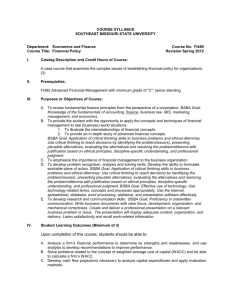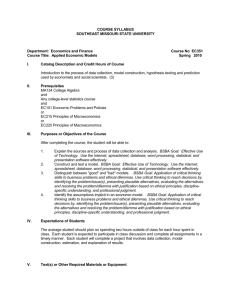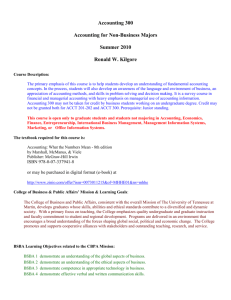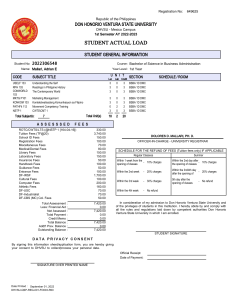Upon completion of this course, students should be able to:
advertisement
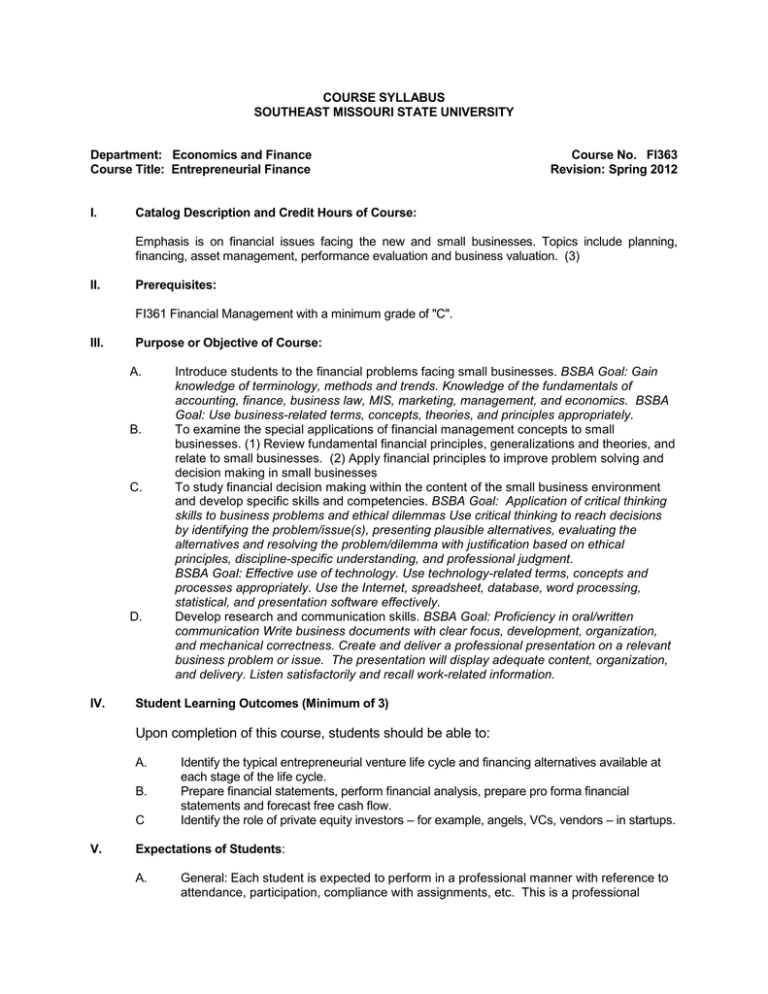
COURSE SYLLABUS SOUTHEAST MISSOURI STATE UNIVERSITY Department: Economics and Finance Course Title: Entrepreneurial Finance I. Course No. FI363 Revision: Spring 2012 Catalog Description and Credit Hours of Course: Emphasis is on financial issues facing the new and small businesses. Topics include planning, financing, asset management, performance evaluation and business valuation. (3) II. Prerequisites: FI361 Financial Management with a minimum grade of "C". III. Purpose or Objective of Course: A. B. C. D. IV. Introduce students to the financial problems facing small businesses. BSBA Goal: Gain knowledge of terminology, methods and trends. Knowledge of the fundamentals of accounting, finance, business law, MIS, marketing, management, and economics. BSBA Goal: Use business-related terms, concepts, theories, and principles appropriately. To examine the special applications of financial management concepts to small businesses. (1) Review fundamental financial principles, generalizations and theories, and relate to small businesses. (2) Apply financial principles to improve problem solving and decision making in small businesses To study financial decision making within the content of the small business environment and develop specific skills and competencies. BSBA Goal: Application of critical thinking skills to business problems and ethical dilemmas Use critical thinking to reach decisions by identifying the problem/issue(s), presenting plausible alternatives, evaluating the alternatives and resolving the problem/dilemma with justification based on ethical principles, discipline-specific understanding, and professional judgment. BSBA Goal: Effective use of technology. Use technology-related terms, concepts and processes appropriately. Use the Internet, spreadsheet, database, word processing, statistical, and presentation software effectively. Develop research and communication skills. BSBA Goal: Proficiency in oral/written communication Write business documents with clear focus, development, organization, and mechanical correctness. Create and deliver a professional presentation on a relevant business problem or issue. The presentation will display adequate content, organization, and delivery. Listen satisfactorily and recall work-related information. Student Learning Outcomes (Minimum of 3) Upon completion of this course, students should be able to: A. B. C V. Identify the typical entrepreneurial venture life cycle and financing alternatives available at each stage of the life cycle. Prepare financial statements, perform financial analysis, prepare pro forma financial statements and forecast free cash flow. Identify the role of private equity investors – for example, angels, VCs, vendors – in startups. Expectations of Students: A. General: Each student is expected to perform in a professional manner with reference to attendance, participation, compliance with assignments, etc. This is a professional B. C. VI. course and requires a professional attitude on the part of the student. This means that the assigned material should be read with discrimination, intellectual curiosity, reflective thinking, and critical analysis. Cases and Mini-cases: Students will apply theories and concepts using cases and minicases. Examinations: There will be a minimum of a mid-term and final examination. The tests will cover both theory and problems. Course Content of Outline: Suggested Time 50 Minute Periods A. B. C. D. E. F. G. H. I. J. VII. Introduction and Overview: Definition and Operating Environment Organizing and Financing a New Venture Business Plan Evaluating Financial Performance Financial Planning Short-term and Long-term Types of Financing and Costs of Financial Capital Business Valuation Venture Capital Harvesting the Business Venture Investment Exam/Other Total Text(s) or Other Required Material or Equipment: Entrepreneurial Finance, Leach, Chris J. and Ronald W. Melicher, 4nd ed., Thomson, Southwestern 2012. VIII. Basis for Student Evaluation: A. B. Examinations Assignments 2 2 4 2 8 8 6 3 3 3 6 45
